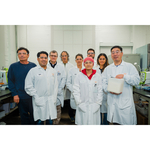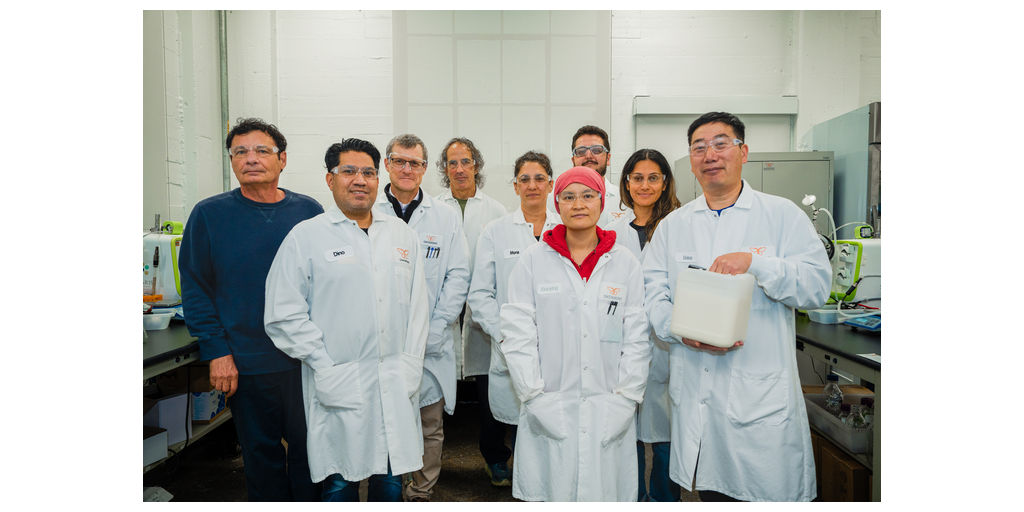Lipids play a major role in early infant development, which includes healthy growth, gut health, digestive comfort and enhanced absorption of vital minerals for infant musculoskeletal development
ALAMEDA, Calif.--(BUSINESS WIRE)--Checkerspot, a biotechnology company and Certified B Corporation™ that produces unique oils through the fermentation of microalgae, published in Frontiers in Nutrition a breakthrough in the development of a new source of human milk fat analogue known as OPO (Oleic-Palmitic-Oleic or sn-2 palmitate).
Human milk contains a complex mixture of triglycerides, making it challenging to recreate using common ingredients. Currently, infant formula companies use conventional oils such as palm, coconut, canola and sunflower oils in an attempt to create formulations that mimic the fatty acid profile found in the lipid fraction of human milk. However, it is incredibly challenging to precisely replicate the composition of human milk triglycerides using only vegetable oils since they do not reflect the unique positioning of the fatty acids on the glycerol backbone. Checkerspot’s technology allows for precise esterification of specific fatty acids at the targeted position (in vivo), allowing for the desired distribution of triglyceride structures at the molecular level. This results in the production of a new generation of OPO for application in infant nutrition products.
In instances where breastfeeding is impractical due to physiological challenges, personal preferences, or other factors, offering alternatives that mimic the nutritional properties of human milk emerges as the preferred choice for parents and caregivers. Checkerspot is dedicated to advancing the science of viable alternatives by harnessing the potential of its microalgae-based molecular biology and fermentation capabilities.
Infant formulas currently available in the market often incorporate structured triglycerides through human milk fat substitutes produced enzymatically. While these first-generation substitutes have notably enhanced the nutritional properties of infant formula, these substitutes exhibit varying levels of sn-2 palmitate, typically ranging from 39% to 65% of the total palmitic acid content. This falls below the level of palmitic acid in the sn-2 position observed in human milk, which is in the range of 70% of total palmitic acid. The variations in these formulations highlight the ongoing efforts in the industry to achieve higher levels of sn-2 palmitate for enhanced health benefits in formula-fed infants.
Checkerspot’s sugars-to-oils molecular biology capability is focused on the development of structured triglycerides and specialty fatty acids that advance nutrition and health. Its molecular foundry has achieved a significant breakthrough with commercial implications by precisely creating carbon chain lengths and specific positioning of fatty acids, while simultaneously scaling up the production of these oils through fermentation. The ability to produce oils on demand in a controlled environment has the potential to strengthen and secure previously long supply chains and improve ultimate traceability for high purity ingredients. The pioneering application of this technology in the field of infant nutrition has been published in Frontiers in Nutrition.
“Microalgae function very much like higher plants when it comes to lipid metabolism. They typically insert saturated fatty acids at the sn-1 and sn-3 positions on the glycerol backbone and unsaturated fatty acids at the sn-2 position. Successfully making a human milk triglyceride in our system posed a formidable challenge because it goes completely counter to its normal lipid metabolism,” said Scott Franklin, Chief Scientific Officer (CSO) at Checkerspot.
“Our published work details the innovative approach we undertook to address this challenge. We elucidate the methodology employed by our team and showcase the new ingredient we designed, highlighting its potential functional benefits in comparison with existing ingredients used to replicate the triglyceride composition found in human milk. We obtained a unique human milk fat analog containing palmitic acid in sn-2 position in the range of 73% of total palmitic acid. This achievement marks a significant stride in advancing the field, as detailed in our groundbreaking article,” commented Franklin, recognizing the years of research needed to design a strain capable of producing the triglyceride structures naturally present in human milk.
A typical infant formula contains approximately 25g of lipids per 100g of powder, with 40-60% of this content consisting of a human milk fat analogue as a proper source of structured triglycerides. The remaining portion of lipids includes vegetable oils utilized as a source of essential fatty acids. Producing structured triglycerides for infant nutrition through fermentation enables precise control, delivering the high quality demanded by this category. Moving forward, a comprehensive food safety evaluation will be conducted to comply with the regulatory regimes in various markets.
About Checkerspot:
At Checkerspot, we make renewable oils at commercial scale for performance materials and ingredients. We innovate at the intersection of biotechnology and materials science to deliver solutions for better products that empower both Fortune 500 companies and small businesses to achieve their decarbonization targets. Our portfolio of materials and ingredients are commercialized in three markets: industrial materials, personal care, and food and nutrition. As a Certified B Corporation™, we believe a post-petroleum future is possible by demonstrating how biomanufactured products can drive profitability for our customers and partners by delivering performance and sustainability benefits at the right price. To learn more, visit us at checkerspot.com.
Contacts
Nina Reyes
nreyes@checkerspot.com













